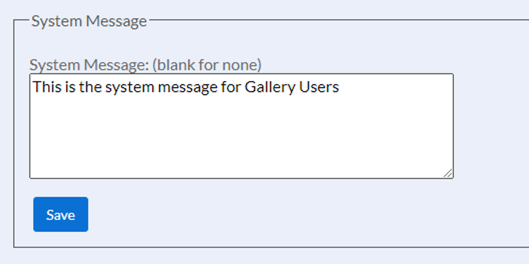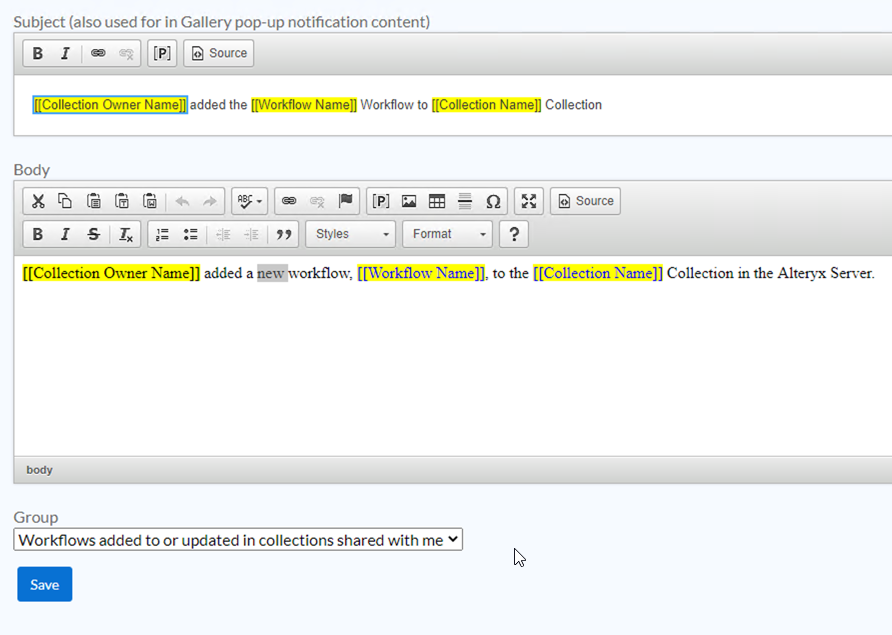Server admins can set up email notifications for various events, for example, Server account registration, password changes, or workflow sharing. Manage enabled email notifications, message text, and email groups on the Notifications page.
Important
As an Server admin, you can't add or remove users to an email group. Email groups serve to group notifications that users can opt in or out of.
Only users who have logged into the Server UI at least once receive email notifications.
Email notifications aren't supported for distribution emails, for example, sales@alteryx.com.
To enable email notifications, enter the SMTP server information in System Settings on the Gallery > SMTP screen. Go to the Gallery help page for more info.
To manage notifications, go to the Notifications page of the Server Admin interface.
You can add a system message to display to Server users when they log into the Server UI. The system message displays as a banner alert at the top of the page when Server users log in. Users can close the system message by selecting OK. You might use this message to notify users of changes or system downtime.

To add a system message, enter your message text in the System Message field and select Save. To remove a system message, delete the text in the System Message field and select Save.

To enable or disable emails, select an email in the list. Change Email status to Enabled or Disabled.
Emails send as HTML by default. HTML emails support images and text formatting. Plain text emails do not support image or text formatting. If users are having trouble viewing the content of email notifications, you may want to switch to plain text. To change how emails are sent, select an email in the list. Change Send email as to HTML or Plain Text.
To edit the default email text, select an email in the list.
In the Subject field, edit the default subject of the email.
In the Body field, edit the message text.
Select Group to change the email group to whom the email is sent. You can also manage email groups on the Notifications page.
Select Save.
Edit Placeholder Variables
The email subject line and body contain placeholder variables that populate based on the user's profile. You can edit which placeholder variable is used, but the populated text for a given placeholder variable can't be changed.
To change the placeholder variable, double-click the highlighted placeholder, for example, [[Collection Owner Name]], and enter a new Placeholder Name. Select OK.

Use email groups to create a grouping of email notifications to quickly turn those notifications on and off.
There are 3 default email groups:
Workflows shared in the Public Gallery
Collections shared with me
Workflows added to or updated in collections shared with me
To review and change the email notifications included in these groups, select an email notification and select an email group in the Group dropdown.
You can also create a custom email group in the Email Group section of the Notifications page.
Enter an email group name and select Add New Email Group.
Then for each email notification you want to add to the group, select the email notification and select your new email group in the Group dropdown.
Disable or Enable a Group of Emails by Turning an Email Group On or Off
Once you have grouped your email notifications using email groups, you can quickly enable and disable multiple email notifications by turning the email group On and Off under Email Groups.
Users can choose to opt out of an email group from Notifications tab of their profile.
Email notifications send for each of these actions once SMTP is set up for your Server. You can disable individual email notifications. Go to Enable or Disable Emails.
Workflow Added to Collection: Sent when a user adds a workflow to a collection.
Workflow Updated in Collection: Sent when a user updates a workflow in a collection.
Collection Shared with User: Sent to the user when another user shares a collection with them.
Membership Granted: Sent when a curator assigns the user a member role.
Artisanship Granted: Sent when a curator assigns the user an artisan role.
Workflow Shared in Public Gallery: Sent when a user shares a workflow to the Public section of My Workspaces (homepage).
Curator Created a New License Owner Account: Sent to the user when their account is created.
Curator Created a New User Account: Sent to the user when their account is created.
License Created: Sent to the curator when they buy a license.
Membership Expired: Sent to the user when their membership has expired.
Membership Revoked: Sent to the user when their membership is revoked.
Validation Email: Email with validation code that is sent to the user when they create an account.
Password Changed: Sent to the user when their password is changed.
Password Reset: Sent to the user when they request a password reset.
Pending User Workflow Added to Collection: Sent to a pending collection user when a workflow is added to a collection that they are invited to view.
Pending User Collection Updated: Sent to pending user when a collection they are invited view is updated.
Pending User Invited to a Collection: Sent to a pending user when they are invited to a collection.
Pending User Granted Membership: Sent to a pending user when they are granted membership.
Pending User Granted Artisanship: Sent to a pending user when they are granted artisanship.
Referral: Sent when a user wants to refer someone to the Server.
Workflow Shared Link: Sent to a user when a workflow has been shared with them.
License Created Notification: Message sent to Alteryx when a new license is created.
Curator Created a New Active User Account: Sent when a curator adds an active account.
Collection Sharing Granted: Sent when sharing rights are granted to a user in a collection.
Collection Sharing Revoked: Sent when sharing rights are revoked to a user in a collection.
Collection Cleanup Error: Sent to Server admins when the collection cleanup background process has an error.